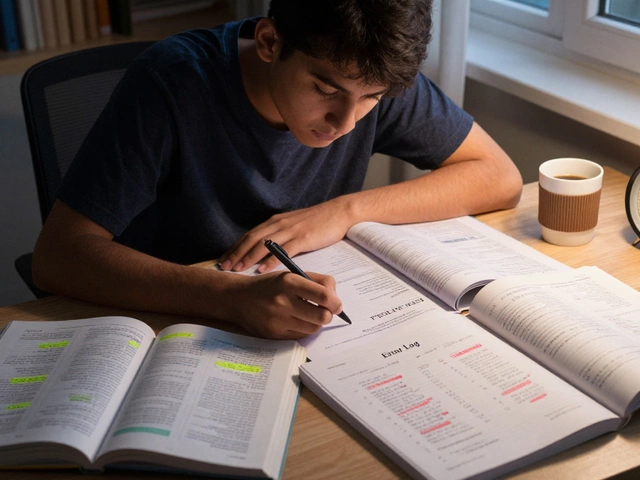India's academic landscape is a crucible of intellectual rigor and competitive spirit, especially for students following the Central Board of Secondary Education (CBSE) curriculum. The journey through school culminates in a series of formidable exams that test the mettle of young minds and help chart their future academic and professional paths.
There are certain exams that have consistently been characterized as exceptionally challenging due to the intensity of preparation required and the sheer number of aspirants vying for success. In this article, we are going to explore three of these arduous exams and offer tips and strategies to navigate them effectively.
Brace yourself as we embark on a deep dive into the Indian Institutes of Technology Joint Entrance Examination (IIT-JEE), the National Eligibility cum Entrance Test (NEET), and the Chartered Accountant (CA) Exam. These examinations not only define careers but also inspire dedication and tenacity among India's youth.
- Introduction to Tough Exams in India
- The Indian Institutes of Technology Joint Entrance Examination (IIT-JEE)
- The National Eligibility cum Entrance Test (NEET)
- The Chartered Accountant (CA) Exam
- Effective Preparation Strategies
- Conclusion: Preparing for Success
Introduction to Tough Exams in India
India’s education system conjures images of sleepless nights and stacks of textbooks for a reason. For young aspirants navigating the labyrinth of academic pressures, the notion of sitting for one of India’s toughest exams is both daunting and exhilarating. These exams are not merely a test of knowledge; they are a rite of passage that can pave the way to prestigious institutions or careers of choice. The proliferation of such high-stakes exams echoes the country's ever-growing emphasis on academic excellence, shaping the futures of millions. Tens of thousands of students each year pin their hopes and dreams on acing these exams, despite the statistic that only a tiny fraction will succeed. For instance, the acceptance rate of the IIT-JEE is less than 2%, a number so stark it often deters even the most diligent of students.
Often, the perception is that acing these exams is a guaranteed ticket to success. But the reality checks in when students sit at their desks, clock ticking, solving problems that test not only their knowledge but their endurance and ingenuity. Behind such competitive scenarios lies a web of deeply ingrained societal values where academic triumph is seen as a reflection of one’s worth. It can be said that preparation for these exams is a lifestyle in itself, involving immense dedication and sometimes at the cost of other facets of student life. The journey often begins years before the actual test day, involving coaching classes, mock tests, and daily hours of study.
There are spirited debates about the pressure these competitive exams exert on students, with some viewing them as necessary for maintaining high educational standards, while others argue they can stifle creativity and cause undue stress. Renowned educator Sugata Mitra once said,
“We have a system of education that is modelled on an industrial age.”His thoughts resonate with many educators who advocate for holistic approaches to learning. However, for many who pass through these rigorous gateways, the reward is deeply satisfying. Students brave this complex system, bringing with them tales of perseverance and resilience that inspire the coming generations.
The Indian Institutes of Technology Joint Entrance Examination (IIT-JEE)
The Indian Institutes of Technology Joint Entrance Examination (IIT-JEE) stands as a monumental challenge for aspiring engineers. Globally acknowledged for its difficulty, this exam serves as the gateway to India's most prestigious engineering institutes, the IITs. It has a cult-like status among students, often becoming a defining feature of their academic journey. Commencing preparation as early as high school, aspirants focus intensely on mastering concepts in Physics, Chemistry, and Mathematics. The syllabus is extensive, and the questions are constructed to test deep understanding rather than rote learning, requiring analytical prowess and conceptual clarity.
The IIT-JEE was split into two parts: JEE Main and JEE Advanced. The former serves as a preliminary screening, while success in the latter opens doors to the elite group of IITs. JEE Advanced, with its complex pattern and unpredictable question types, demands creative problem-solving. For instance, unlike typical exams, it may require candidates to apply theoretical concepts in novel situations, often answering in multiple steps using logical reasoning.
Statistics shared annually by the National Testing Agency reveal the competiveness of JEE. In the most recent year, around 2.5 million students registered, with only a fraction securing admission. Such fierce competition puts immense pressure on teenagers, making the journey fraught with stress. A survey by a leading educational research group indicated that average study hours often exceed eight daily during peak preparation months.
"Cracking the IIT-JEE is not just about work but the work done with strategy," said Ramesh Sharma, a renowned physics educator known for his mentoring of successful IIT aspirants.
Preparation tips abound, but common elements include developing a robust study schedule, incorporating varied problem-solving approaches, and revising thoroughly. Aspirants often adopt diverse materials, from textbooks to online resources, delving beyond what's taught in school. Study groups also provide collaborative environments where students challenge each other's understanding and solve difficult problems together.
While success stories grace headlines, the toll this test takes is palpable. It demands more than intelligence; it requires perseverance, mental fortitude, and a clear mindset to balance rigorous preparation with rest. The IIT-JEE is less a test and more a transformative experience, often building character as much as it shapes intellectual capabilities.

The National Eligibility cum Entrance Test (NEET)
One of the most challenging exams for aspiring medical students in India is the National Eligibility cum Entrance Test (NEET). Established under the guidelines of India’s Medical Council, NEET stands as the gateway to undergraduate medical and dental courses in the country’s prestigious institutions. With its roots going back to 2013, this exam has streamlined the process of medical admissions and eliminated numerous state-level entrance tests, making it the quintessential assessment of aspirant capabilities and readiness for the medical profession.
The NEET exam is revered not only for its comprehensive nature but also for its ability to test a student’s grasp over subjects like Physics, Chemistry, and Biology. It consists of 180 questions divided evenly among these three subjects, ensuring a balanced evaluation of the student's aptitude. Students are expected to complete this within three hours, which lends a sense of urgency and pressure that they must navigate skillfully. The competitive nature is intensified by the massive number of applicants who annually appear for NEET, often exceeding 15 lakh, all vying for a limited number of seats in prestigious institutions.
"The rigor and competition embedded in NEET not only gauge the academic knowledge of aspirants but also test their perseverance and strategic capabilities," says Dr. P. Mahesh, a reputed educator and author.
Having a deep understanding of the importance of time management is crucial for cracking NEET. Aspirants should focus on maximizing their performance in individual sections, especially since negative marking plays a critical role in the outcome. This means that a strategically wrong answer could diminish the overall score significantly. Applicants need meticulous preparation, often beginning their coaching from as early as Grade 11, embedding concepts and theories early in their academic journey. Practical tips include practicing mock tests, adhering to a structured timetable, and engaging in peer discussions to gain diverse insights and tips.
Data from recent years illustrates the growing competition and the subsequent rise in cut-off marks. As seen below, these trends serve as both a challenge and a motivator:
| Year | Number of Applicants | Cut-Off Score |
|---|---|---|
| 2021 | 16 lakh | 720-138 |
| 2022 | 18 lakh | 720-147 |
| 2023 | 18.5 lakh | 720-152 |
For many, the balance between school studies under the CBSE syllabus and NEET coaching can become overwhelming, but this demands discipline and a clear strategy. Regular revisions and a focus on understanding core concepts rather than rote learning can yield better results. Additionally, paying attention to diet, rest, and relaxation techniques is essential. It's not only about hard work but also about smart work.
In essence, NEET represents a rite of passage for medical aspirants, building resilience and providing a realistic preview of the challenges inherent in the medical profession. Those who approach it with sincerity, diligence, and strategy tend to excel, opening doors to a rewarding career in medicine. The journey is intricate but immensely gratifying for those passionate about healing and making a difference in the healthcare domain.
The Chartered Accountant (CA) Exam
The Chartered Accountant (CA) Exam in India stands as a beacon of prestige and challenge within the academic world. It's a tri-level journey designed to sculpt individuals into financial experts, with rigorous demands that require aspirants to invest substantial time and dedication. This examination, administered by the Institute of Chartered Accountants of India (ICAI), begins with the CA Foundation, progresses through the CA Intermediate, and culminates in the CA Final. Each stage is an arduous test of knowledge and perseverance, attracting candidates from diverse educational backgrounds and offering them a doorway to lucrative careers in finance and accountancy.
Success in the CA Exam necessitates not just intellectual acumen but also strategic thinking and practical application of complex financial concepts. Candidates are often encumbered with voluminous textbooks covering a vast landscape of accounting topics such as taxation, auditing, financial reporting, and law. It's common for aspirants to dedicate several months, if not years, preparing for each stage, often juggling professional commitments alongside studying. The path to becoming a Chartered Accountant is rarely a solitary endeavor, with students undertaking mentorship from peers and seasoned accountants to navigate the intricacies of the examination successfully. Toughest exams in India earn this title not merely due to the material but because of the unwavering dedication required from the candidates.
The CA Exam is renowned for its low pass percentage, with many students attempting multiple times before achieving success. This statistic should not deter aspirants but rather instill a sense of resilience and determination. Historical data reflects an average pass percentage hovering around 15-20% for the CA Final, indicating the level of competition and thoroughness required to excel. A quote from a seasoned professional echoes this sentiment:
"The CA journey is not just about passing an exam; it's about transforming your perspective on dedication, discipline, and learning. It's a rite of passage that equips you with the tools to tackle even the most challenging of financial conundrums."
Preparation for this competitive exam often involves strategic planning, starting with the foundational principles and building up to advanced topics. A popular approach includes breaking down the syllabus into manageable sections and setting clear daily targets. Engaging in active learning through case studies, interactive problem-solving, and group discussions can provide invaluable insights that passive reading may not. Many successful candidates advocate for consistent practice of past question papers and mock tests, which help in familiarizing oneself with the exam pattern and time management. Such strategies not only enhance confidence but also sharpen analytical skills, which are pivotal in cracking the CA exam.
Interestingly, while some students embark on this journey right after their secondary education, others choose to switch from alternative career paths, drawn by the prestige and opportunities that come with being a Chartered Accountant. Regardless of when one chooses to start, the commitment stays the same. A balanced routine that incorporates rest, revision, and recreation is crucial to maintain motivation and prevent burnout. Remember, the CA Exam is not just an academic challenge; it reshapes how you manage your time, stress, and aspirations. Whether you're a novice stepping into this intensely demanding field or a seasoned professional seeking further credentialing, the CA Exam holds a substantial promise of transformation and achievement.

Effective Preparation Strategies
Tackling some of the toughest exams in India, such as the IIT-JEE, NEET, and the CA exam, requires a well-thought-out preparation strategy that encompasses dedication, time management, and the right resources. These exams demand not only a deep understanding of concepts but also the ability to solve complex problems under time constraints. Thus, the preparation approach must be multifaceted.
Firstly, having a clear study plan is crucial. This plan should break down the vast syllabus into manageable chunks and distribute study hours across different subjects based on one's strengths and weaknesses. Integrating regular revisions into this schedule is key as it helps in retaining information over the long haul and making connections across various topics. The use of tools such as planners or digital apps can aid in tracking daily progress and maintaining motivation throughout the study process.
In addition to individual study efforts, joining a coaching institute or online platform can be beneficial. These resources offer structured courses, expert guidance, and a plethora of practice material that are tailored for specific exams. More importantly, they provide mock tests that simulate real exam conditions, helping students get accustomed to the pressure and pacing required on the exam day. Mock tests also help in identifying weak areas, enabling focused study in subsequent sessions. According to Dr. Preeti, an education expert,
“Mock tests are not just about checking your score, but about analyzing your mistakes and learning the best methods to rectify them.”
Time management during exams is another essential aspect of preparation. Practicing with timed tests is a way to hone this skill. It helps students understand the best approach to answer questions efficiently, whether it requires tackling easier questions first or dedicating time to challenging problems upfront. Mock exams can serve as a great tool to perfect these techniques.
Beyond academics, maintaining physical and mental health plays a significant role in an effective preparation strategy. Regular physical activity, healthy eating, and sufficient sleep are indispensable, as they promote overall well-being and cognitive function. Stress management techniques such as meditation or yoga can be especially beneficial in ensuring students remain calm and focused. A supportive study group can also provide encouragement and a platform for discussing challenging topics, which helps in reducing feelings of isolation often experienced during intense study periods.
Keeping oneself updated with current trends in the specific examination fields can offer an added advantage. Students should frequently refer to the examination bodies’ official websites for updates on any changes in the exam pattern or syllabus. Additionally, connecting with seniors or mentors who have recently cleared these exams can offer fresh insights and first-hand tips on what truly matters. This community support can prove invaluable, providing encouragement and real-world understanding beyond textbooks and notes.
Conclusion: Preparing for Success
The road to conquering the toughest exams in India, including the CBSE exams, is lined with challenges that test students' determination and resilience. Preparing for these exams is not merely about cramming vast amounts of information; it involves strategic preparation and maintaining a balanced approach. Beginning well in advance, students should focus on understanding the core concepts rather than rote learning. Mastery of topics can be achieved by setting achievable milestones and revisiting complex concepts regularly. Practice is indeed a critical part of this journey, where solving previous years' papers and mock tests plays a pivotal role.
Time Management
Time management is another crucial element in preparing for these critical exams. Mapping out a study schedule that divides time equitably among subjects, with a focus on weaker areas, can make a substantial difference in boosting confidence and knowledge retention. During the preparation period, taking short breaks can aid in maintaining mental freshness and reducing burnout. Experts recommend the Pomodoro Technique—work for 25 minutes, then take a 5-minute break—as it helps sustain focus while preventing fatigue.
It is essential to adopt a healthy lifestyle alongside academic preparation. Regular physical activities, such as yoga or a simple walk, can significantly enhance mental clarity and physical health. Maintaining a balanced diet and ensuring adequate sleep is equally important, as they contribute to better cognitive functions. The journey is undoubtedly an arduous one, but with the right strategies, success is attainable.
Guiding Words
Many educators emphasize the importance of staying motivated and focused throughout the preparation. As Dr. A.P.J. Abdul Kalam once said,
"If you want to shine like a sun, first burn like a sun."This quote is a reminder that dedication and hard work are essential ingredients for success. Adopting a positive mindset, while also seeking guidance from mentors and peers, can provide much-needed encouragement. Students are encouraged to join study groups that can offer diverse perspectives and collaborative problem-solving, enriching overall understanding.
In conclusion, approaching these challenging exams with diligent strategies and mental fortitude will greatly increase the chances of not just tackling them, but excelling. With preparation that balances learning with well-being and motivation, students can face the examination rooms armed with confidence and unparalleled resolve.




